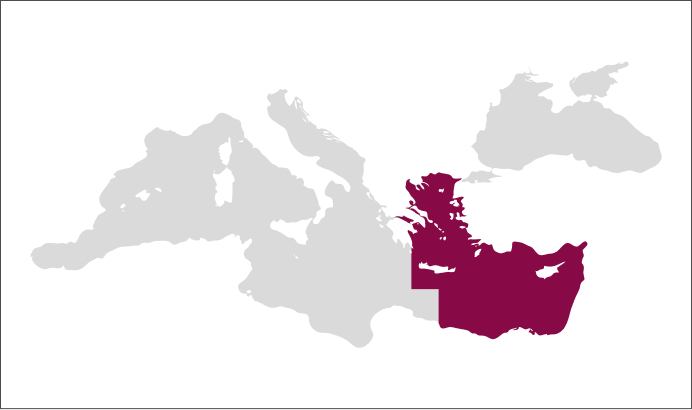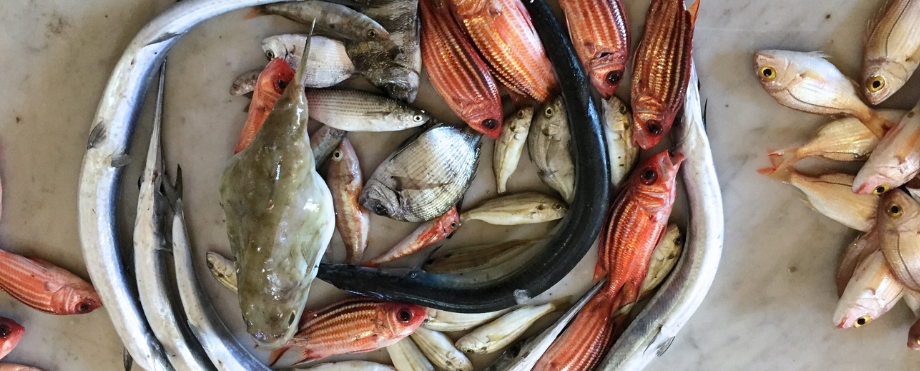Pilot Project on Non-Indigenous Species in the eastern Mediterranean
Acknowledging the growing prevalence of Non-Indigenous Species (NIS) in the Mediterranean Sea, the GFCM Scientific Advisory Committee on Fisheries (SAC) agreed in 2021 to launch an in-depth reflection on NIS and consolidate an Observatory*. The aims are to integrate all available information, foster engagement between relevant actors at the Mediterranean level, improve the understanding of the interactions of NIS with receiving ecosystems, as well as investigate effective management through fisheries management tools and/or nature-based solutions.
In 2022, at its 45th Session, the GFCM endorsed a pilot project on NIS in the eastern Mediterranean explicitly in line with Target 1 (Fisheries and Ecosystems) of the GFCM 2030 Strategy, aiming to:
- Continue the work initiated towards the establishment of an integrated monitoring platform and monitoring plan for NIS in the eastern Mediterranean with the aim of later expanding it to other GFCM subregions.
- Collect data on NIS, including through Local Ecological Knowledge (LEK)* studies and participatory mapping.
- Starting from the eastern Mediterranean, experiment fisheries management actions, also within marine protected areas, to understand and mitigate the impacts of NIS on receiving ecosystems (including native commercial species), with the aim to maintain their ecological integrity and resilience.
- Organize dedicated expert meetings to compile and analyse data on NIS in the subregion.
This pilot project will be carried out in the eastern Mediterranean in the context of the MedSea4Fish - the GFCM capacity development programme for the Mediterranean Sea. Its main objective is to support riparian countries and relevant stakeholders in fulfilling their objectives in line with the GFCM 2030 Strategy and creating a level-playing field that facilitates addressing the sustainability of fisheries at the national, subregional and regional levels.
Considering both the extensive information already available and the data to be collected through the GFCM monitoring activities (e.g. surveys-at-sea, incidental catch of vulnerable species and discards monitoring programmes), as well as the relevant results of a five-day training course on the application of the LEK-1 protocol in 2021, the pilot project on NIS in the eastern Mediterranean is based on the following elements:
- Collation and analysis of available information on NIS
- Implementation of country-based pilot studies
- Creation of solid national stakeholders networks
- Testing of LEK protocols over the span of a whole year to set an effective and long-term participatory strategy on NIS monitoring
- Drafting of a proposal of technical recommendations for management by species
- Set-up of an Observatory on NIS that will take over the national networks after the end of the project’s activities as well as possibly bringing together information collected by other partner organizations across the Mediterranean.

ACTIVITIES
The research programme has five specific objectives, each corresponding to as many work packages (WP):
WP 1. Coordination, Networking, Dissemination, and Sustainability.
WP 2. Collation and analysis of available information, and possible implementation of country-based pilot studies.
WP 3. Testing LEK protocols over the span of a whole year in eastern Mediterranean countries, in collaboration with local fishers and relevant stakeholders
WP 4. Data analysis and reporting.
WP 5. Proposal of technical recommendations for management by species
Observatory
The Observatory is foreseen to be an integrated monitoring platform for NIS that will facilitate the transfer of information and methodological aspects within the network of scientific experts and the broader community bringing together the results of the pilot project as well as existing information across the eastern Mediterranean with a view to expanding it to the entire Mediterranean in the future.
Local Ecological Knowledge
The GFCM adopted the Local Ecological Knowledge (LEK) as an alternative source of information on NIS species presence, abundance and behaviour indices. LEK data collection brings forward the knowledge of local fishers and divers. LEK provides additional knowledge to build up suitable models for stock assessment for these species and also to take into consideration their impact of (if any) on the native ones, the ecosystem and on fisheries.
Learn more about the GFCM's research programmes.

